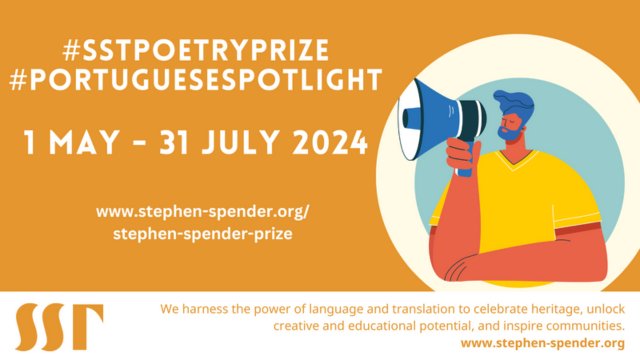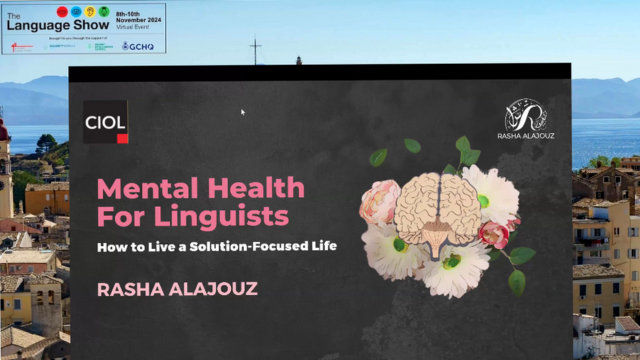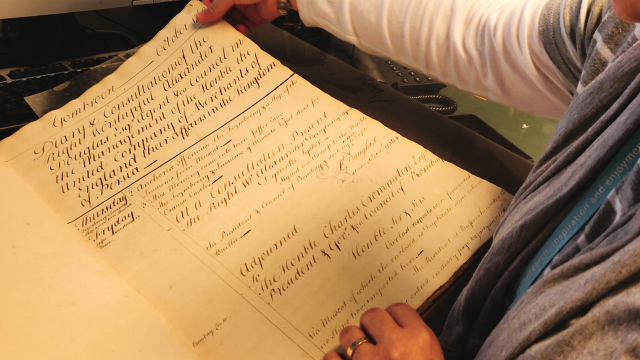-
QUALIFICATIONS
- For Linguists Worldwide
- For UK Public Services
- Preparation
- Policies & Regulation
-
MEMBERSHIP
- Join CIOL
- Membership grades
- NEW for Language Lovers
- Chartered Linguist
- Already a member?
- Professional conduct
- Business & Corporate Partners
-
ASSESSMENTS
- For Second Language Speakers
- English as a Second Language
-
EVENTS & TRAINING
- CPD, Webinars & Training
- CIOL Conference Season 2025
- Events & Networks
- CIOL Mentoring
-
NEWS & VOICES
- News & Voices
- CIOL eNews
- CIOL Awards
- The Linguist
- Jobs & Ads
-
RESOURCES
- For Translators & Interpreters
- For Universities & Students
- Standards & Norms
- CIOL & AI
- All Party Parliamentary Group
- In the UK
- UK Public Services
- Find-a-Linguist
The Stephen Spender Prize 2024
By Rosie Eyre

When I began coordinating the Stephen Spender Prize in 2021, from a box room overlooking an Aldi car park in the second summer of lockdown, it was hard not to feel like the world had closed in. But as life gradually opened up again, and my first autumn of prize coordination introduced me to poems translated by entrants of every age, from more languages than I could ever have listed, so did my horizons.
Growing up at a Blackpool comprehensive, the idea that I’d one day coordinate a prize for poetry in translation would have seemed fanciful: languages were niche, poetry was exclusive, and poetry in other languages was a concept that was foreign in every sense of the word. Based on that logic, my younger self would have assumed that such a prize was a closed club. The past three years have shown me that it’s anything but.
In essence, the rules of the Prize are very simple: translate any poem from any language into English, and write a short commentary on the translation process. Yet behind this invitation, questions abound. If reading poetry isn’t something you do every day – or ever – where do you find a suitable poem? If you’ve never written a commentary before, and essay-writing brings you out in a cold sweat, how do you go about analysing your translation decisions? And if you’ve never translated a poem – or perhaps anything – before, where on earth do you start?
When I joined the Stephen Spender Trust, the quest to resolve these questions and make the prize as inclusive as possible was already well underway, with a new guide for adult newcomers to poetry translation, a range of suggested poem booklets for young translators and a compendium of poetry translation resources for schools, as well as a new option for teachers from the burgeoning number of participating schools to submit entries on their students’ behalf.
After launching a virtual Guide to the Commentary and step-by-step Guide for Teachers in 2022, last year we continued to make the Prize ever more inclusive by introducing a dedicated strand for teachers submitting on behalf of students, the Schools Laureate Prize, accompanied by a new, free translation competition for teachers at participating schools, the Teacher Laureate Prize.
For the first time, the Schools Laureate Prize offered young people the chance to reflect on the translation process and respond to the original poem through artwork, creative writing and video- and audio-based alternatives to the traditional written commentary, a selection of which you can enjoy in the 2023 prize booklet and on our 2023 prizewinners webpages.
At the same time, we extended the adult category – previously open to entrants in the UK and Ireland – to budding and established translators everywhere, bringing a fresh resonance to its ‘Open’ name in welcoming translations into Englishes written and spoken the world over. In its first year, the newly international Open category saw entries from thirty-five countries across six continents, with two-thirds coming from first-time entrants. This flourish of nations was mirrored by a blossoming of the number of languages from which entrants translated their poems, which passed the hundred mark for the first time with 104 languages across all categories.
At the livestreamed Prize Celebration Event in November 2023, which was attended virtually by entrants, poets, translators, teachers and poetry supporters from around the world, Stephen Spender Trust Trustee Ben Bransfield paid tribute to ‘an inspiring celebration of language – a wonderful festival of everywhere’. His words were echoed by judge Samantha Schnee, who described how the Prize ‘really creates a sense of community’.
As we celebrate the Prize’s twenty-first birthday in 2024, my hope is that more people than ever, wherever they live, however old they are, whichever languages they speak and whatever their background, will feel that poetry translation is for them – and that, in a world that has seen profound technological and social changes since it began life in 2004, the Prize will shine brighter than ever as a beacon of human creativity and connection.
Rosie Eyre is Prize Coordinator at The Stephen Spender Trust and a literary translator from French and Spanish. Having been born and bred in Blackpool, she now lives in the South of France.
The Stephen Spender Prize 2024 is open for entries until midnight (BST) on Wednesday 31 July, welcoming translations into English of published poems from all languages. Find full details and links to enter on the Stephen Spender Prize homepage: https://www.stephen-spender.org/stephen-spender-prize/
Views expressed on CIOL Voices are those of the writer and may not represent those of the wider membership or CIOL.
More
The Chartered Institute of Linguists (CIOL), Incorporated by Royal Charter, Registered in England and Wales Number RC 000808 and the IoL Educational Trust (IoLET), trading as CIOL Qualifications, Company limited by Guarantee, Registered in England and Wales Number 04297497 and Registered Charity Number 1090263. CIOL is a not-for-profit organisation.









